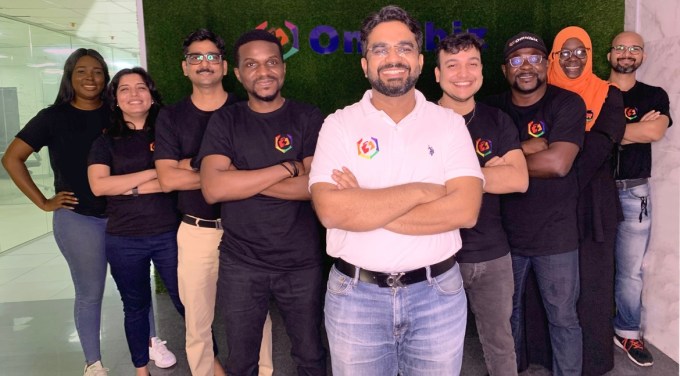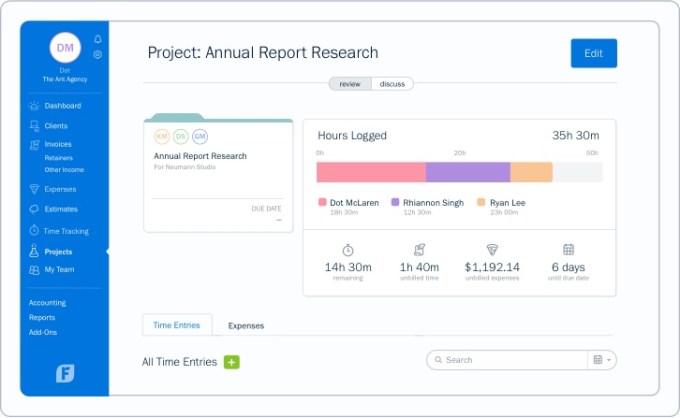Despite the prevalence of shopping malls and the emergence of VC-backed e-commerce companies like Jumia, informal retail in Africa is still king.
A 2016 study by PwC states that 90% of sales in Africa’s major economies come through informal channels — markets and kiosks.
This presents a large market ripe for digitization, and over the past five years, African startups have risen to the challenge, raising millions of dollars in the process. Today, Omnibiz, a Lagos-based startup, joins the fray and has raised a seed round of $3 million to expand into new markets.
Omnibiz is a B2B e-commerce platform that connects fast-moving consumer goods (FMCGs) manufacturers to retailers by digitizing the supply chain stakeholders.
The platform offers a mobile app, WhatsApp channel and a phone number that retailers can use to stock their shops. Omnibiz says in a statement that retailers “can place orders at their convenience and have goods delivered to their doorstep at no cost.”
Omnibiz was launched in 2019 by Deepankar Rustagi. The Indian founder and CEO who has stayed in Nigeria for over two decades started his first startup, VConnect, in 2011 as an online marketplace and search engine to find local professionals for service needs.
The platform connected individuals with more than 100 services and over 500,000 listed businesses across the country before shutting down in 2017, Rustagi claims.
Post-VConnect, Rustagi consulted for multiple FMCG brands. He figured a need existed for manufacturers and retailers of goods to digitize their processes leading to the launch of Omnibiz in late 2019.
Omnibiz operates an asset-light retail distribution model. When a retailer makes an order on the Omnibiz platform, it is requested from partner distributors who store goods on behalf of manufacturers and are traditionally known to help out with warehousing and transportation.
With Omnibiz, these distributors can focus solely on warehousing and pass on the responsibility of transporting goods to Omnibiz’s third-party logistics providers. The drivers of these logistics providers use Omnibiz to efficiently distribute the orders to the retailers within 24 hours.
“We work with manufacturers to provide visibility. Then buy goods from them and keep them in partner hubs that act as warehouses and distributors. Then, use the services of drivers that work with third-party logistics drivers who get paid on every delivery made,” Rustagi told TechCrunch.

Image Credits: Omnibiz
Digitizing this value chain helps retailers save working capital while Omnibiz connects them with more than 20 brands, including Coca-Cola, Nestlé, Kellogg’s, Unilever, Procter & Gamble and Kimberly-Clark.
The B2B e-commerce retail company is currently in four cities across Nigeria — Lagos, Abuja, Port Harcourt, and Kaduna. The company will add two more cities, Ibadan and Kano, before the end of August, Rustagi adds.
By Rustagi’s account, Omnibiz will feed off his experience at VConnect, his prior business that struggled to monetize and scale despite the huge traction it got as a popular local marketplace.
“We knew about small businesses and what sort of technology they like. That was our specialization, but our business model didn’t work. But in this case [Omnibiz], the monetization happens on our platform, and there’s money to be made for the small business. We’ve been growing 30% month-on-month for the last 12 months,” he said.
The B2B informal e-commerce market has seen a resurgence in the last couple of years. Kenya’s Sokowatch and Twiga, Nigeria’s TradeDepot and Egypt’s MaxAB have longed vied for market-leader positions in their respective markets.
The pandemic spiked more interest in their activities as all the aforementioned startups have raised money this past year, including newcomers Kenya’s MarketForce and now Omnibiz.
Some operate asset-light models, while others take up the responsibility of managing the end-to-end digitization process. Rustagi believes the former is perfect for the company because it helps distributors expand their reach rather than eliminate them.
“I think scaling in one city with assets is not that difficult. But if you have to scale in 20, 24 cities in a country like Nigeria or Ghana, or Ivory Coast or East Africa, the investment required will be very high.” Rustagi continued. “So we think without significant investment in assets, we will be able to scale much faster. And since we took the tech-first approach, we have good control over the business. I believe we’re in the right space and the right time with the right model.”
Omnibiz’s seed round was led by V&R Africa, Timon Capital and Tangerine Insurance. The round also included Lofty Inc., Musha Ventures, Sunu Capital, Launch Africa, and Rising Tide Africa. It takes the company’s total investment to $4 million. Rustagi also disclosed that the company also got funding from Seedstars and will participate in the accelerator’s growth program.
“I think Omnibiz will be the role model for B2B retail in Africa and can scale well into other emerging markets. We are excited and happy to be supporting Omnibiz in all ways beyond just providing capital,” Raj Kulasingam and Vishal Agarwal of V&R Africa said in a statement.
Over the next few months, Omnibiz will use the investment to expand in other West African cities outside Nigeria — Abidjan, Takoradi, Kumasi and Accra. Food, non-alcoholic beverages, personal care, and baby care products are the top categories on the Omnibiz platform. The company is planning to expand into new categories like alcoholic beverages and OTC pharmaceutical products.
Omnibiz will also use the investment to create new tech products that will enhance value for the retailers. The company will work with partners to increase the working capital availability for the retailers and digital tools to manage their business more efficiently.
“One of the key things we intend to do is to bring on medium-scale manufacturers who find it difficult to get the last-mile delivery to reach customers. We want to scale them so they can reach a large number of retailers. That’s something we are rolling out so we can onboard more and more manufacturers,” said the CEO on Omnibiz’s next plans.



 . More at:
. More at: 